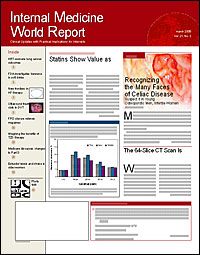Publication
Article
Internal Medicine World Report
Ancient Remedy a Promising Cancer Therapy
In the ongoing fight against cancer, researchers have synthesized an ancient remedy into a promising new compound that uses the voracious appetite of cancer cells for iron to transform them into a target.
The substance?artemisinin?is de?rived from the wormwood plant, which has been used for centuries in China to treat malaria. Previous work by Henry Lai, PhD, and Narendra Singh, MD, both bioengineers at the University of Washington, Seattle, indicated that artemisinin alone could selectively kill cancer cells while leaving normal cells unharmed.
New data, which were published in Cancer Letters (2006;231:43-48), showed that the substance appeared to prevent the onset of breast cancer in rats given a cancer-causing agent. Previous data, published in Life Sciences (2005; 76:1267-1279), show that artemisinin appears to greatly enhance the deadly selectivity process.
The trick to the compound's effectiveness appears to be its ability to take advantage of how cancer cells function. Because they multiply rapidly, most cancer cells need more iron than normal cells to replicate DNA. To facilitate this, cancer cells have inlets on their surfaces, known as transferrin receptors, in greater numbers than do other cells. These receptors allow the quick transport of transferrin, an iron-carrying protein found in the blood, into the cell.
Artemisinin is bound to transferrin at the molecular level, thus bringing together the 2 ingredients to "fool" the cancer cell.
"We call it a Trojan horse, because the cancer cell recognizes transferrin as a natural, harmless protein," Dr Lai explained. "So the cell picks up the compound without knowing that a bomb?artemisinin?is hidden inside."
Once inside the cell, the artemisinin reacts with the iron, creating free radicals that attack other molecules and the cell membrane, breaking it apart and killing the cell.
"By itself, artemisinin is about 100 times more selective in killing cancer cells as opposed to normal cells," Dr Lai said. "In this study, the new artemisinin compound was 34,000 times more potent in killing cancer cells as opposed to their normal cousins." Experts warn that its potential use in humans is still years away.?R.M.





